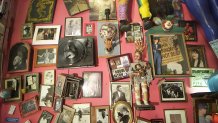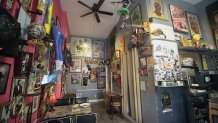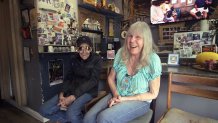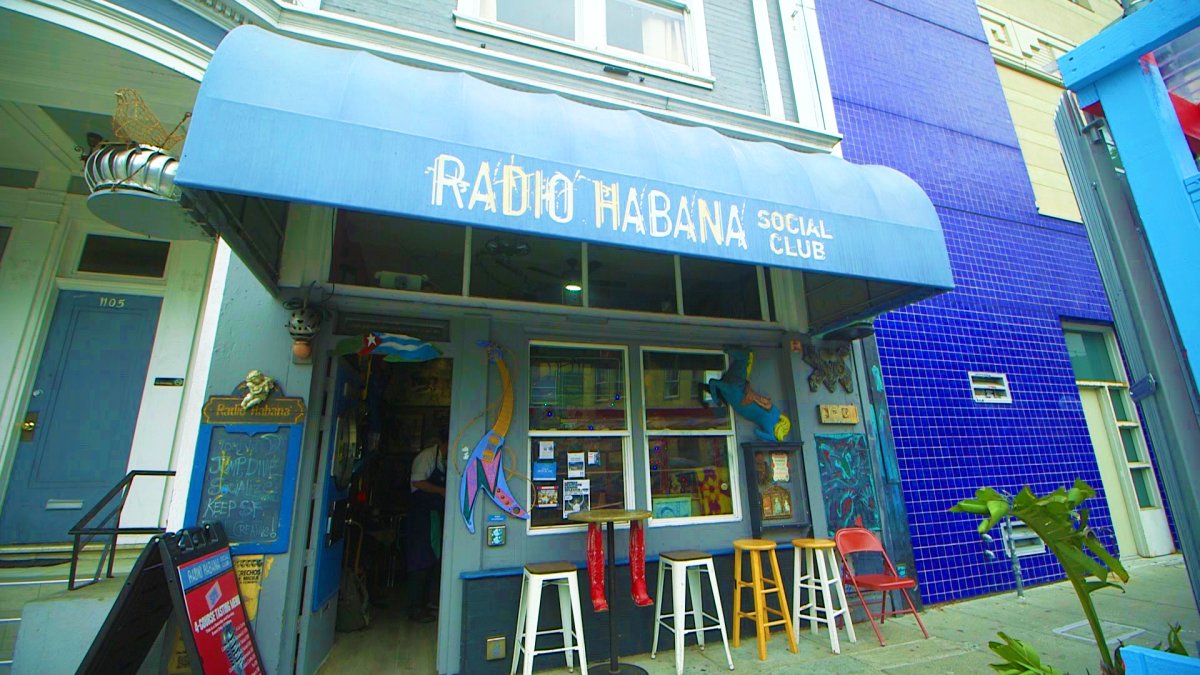On San Francisco’s Valencia corridor, with its blocks of hip restaurants and chic shops peddling $150 dollar pens and Japanese denim, the survival of the tiny Radio Habana Social Club seems like something of a miracle.
Its single room is an art gallery, with mechanical art pieces whirring above a smattering of dining tables. It’s no wonder people who aren’t in the know are confused wandering by.

The walls of Radio Habana Social Club in San Francisco’s Mission District are filled with art — much of it by owner Victor Navarrete, an artist who emigrated from Cuba.
“That’s the most common comment walking by the window,” said co-founder Leila Mansur. “What is this place?”
If you were to take a guess — bar, art gallery, restaurant, music venue, neighborhood think tank — you’d be right. It’s all of those things. And probably a bunch more. Since opening in 1998, it’s become the neighborhood’s de facto living room.

Radio Habana Social Club in San Francisco’s Mission District has been a neighborhood living room since 1998.
“It’s basically a house of intellectuals and artists,” said chef Manuel Torres Ximenez, who somehow concocts Cuban-inspired dishes inside the social club’s minuscule kitchen. “Where everybody has a feeling that you are in a Cuban living room.”
The social club’s current iteration came when artist Victor Navarrete, a Cuban exile, bought the business from a friend. Navarrete and his wife, Mansur, didn’t necessarily want a restaurant or a bar, but a place where the community could gather. Where people could talk art and politics, while listening to live rhumbas all flanked by Navarrete’s art pieces.
“We began right around the time of Buena Vista Social Club,” said Mansur, referencing the Cuban musical band and record featuring legendary Cuban musicians. “It’s not a private club of course, the exact opposite.”
Patrons can belly up to the bar for a glass of sangria, a game of dominos, while listening to a guitarist playing boleros, or a group tapping out beats on conga drums.
“Most of the people that come here were creative people of one form or another,” said Mansur. “And many of them of course were musicians, and they would come and have a guitar with them.”
Navarrete was a well-known artist in his native Cuba, working for the Castro Administration until he became disillusioned and escaped in a boat. Neither he nor Mansur knew anything about the bar or restaurant business when they opened the space.
Mansur admitted it’s been a struggle to keep the venue afloat over the years. The struggle compounded even before the pandemic when the building underwent a retrofit, and they were forced to close their doors for a long period. The pandemic only added to the struggle.
But there was a silver lining — a new parklet installed a year into the pandemic doubled the business’s space and along with a city jam permit, turned the parklet into a beloved music venue. On any given night, the pandemic was filled with conga lines, Latin bands and other performers. But last June, a freak windstorm brought the curtain down on the outdoor scene.
“I’m walking around the corner,” said Ximenez. “I watch the parklet fly in the air, flip over and smash into the street.”
The sudden loss of the parklet was devastating to the business. But the same community that’s found a home in Radio Habana, also came to its rescue. Nonprofit group Clecha rebuilt the parklet. And a GoFundMe campaign generated enough funds to keep the business going. But Mansur admitted the financial struggles are ongoing.
“If it had not been for that GoFundMe this would not be here,” Mansur said. “Like clawing your way up a very slick hill.”
The ongoing survival of the small bar, restaurant, music venue, gathering spot, domino playfield, art depository and more, has become a neighborhood interest. Something Mansur acknowledges with pride.
“The cafe is bigger than both of us,” she said, sitting next to Navarrete at their tiny bar, surveying their artistic kingdom.

Victor Navarrete and Leila Mansur, owners of Radio Habana Social Club sit at the bar in the beloved San Francisco venue.
A few feet away, Ximenez summed up the feelings of many.
“I’m just one of the thousands of community members that love Victor and Leila, and love Radio Habana Social Club, Ximenez opined. “And believe in this free music, free space.”

